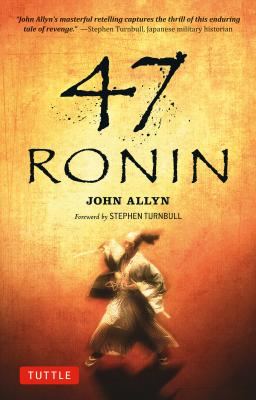47 Ronin. John Allyn
Читать онлайн.| Название | 47 Ronin |
|---|---|
| Автор произведения | John Allyn |
| Жанр | Сказки |
| Серия | Tuttle Classics |
| Издательство | Сказки |
| Год выпуска | 0 |
| isbn | 9781462906239 |
First published in 1970 by Tuttle Publishing, an imprint of Periplus Editions (HK) Ltd.
www.tuttlepublishing.com
Copyright © 2012 Charles E. Tuttle Publishing Company, Inc.
All rights reserved. No part of this publication may be reproduced or utilized in any form or by any means, electronic or mechanical, including photocopying, recording, or by any information storage and retrieval system, without prior written permission from the publisher.
Library of Congress Catalog Card Number: 70-121274
ISBN: 978-1-4629-0623-9 (ebook)
Distributed by
North America
Tuttle Publishing
364 Innovation Drive
North Clarendon, VT 05759-9436
Tel: (802) 773-8930
Fax: (802) 773-6993
Japan
Tuttle Publishing
Yaekari Building, 3rd Floor, 5-4-12 Osaki,
Shinagawa-ku, Tokyo 141 0032
Tel: (81) 3 5437-0171
Fax: (81) 3 5437-0755
Asia Pacific
Berkeley Books Pte. Ltd.
61 Tai Seng Avenue #02-12, Singapore 534167
Tel: (65) 6280-1330
Fax: (65) 6280-6290
15 14 13 12 5 4 3 2 1 1204MP
Printed in Singapore
TUTTLE PUBLISHING® is a registered trademark of Tuttle Publishing, a division of Periplus Editions (HK) Ltd.
Contents
Among flowers, the cherry blossom;
among men, the samurai.
—Japanese proverb
Foreword
The Raid of the Forty-seven Ronin holds a unique place in Japanese history. There is nothing quite like it, and John Allyn’s masterful retelling of the tale captures for modern readers much of the excitement with which the Japanese populace of the mid-eighteenth century would have responded to what for them was the equivalent of a newspaper sensation.
Yet modern readers have more in common with them than mere excitement, because, like the Japanese of contemporary Edo, we are forced to look at the story through a very large distorting lens. This lens is provided by a play from the Japanese kabuki theater that was based on the raid and is called Kanadehon Chushingura, of which the title is usually shortened to Chushingura (The Treasure House of the Loyal Retainers). The play was first produced in Edo (modern Tokyo) in 1748 and has never left the repertoire since. This unashamedly fictionalized version of the story, involving changes of names, dates and locations, is universally recognized for what it really is: a classic drama based on a fictionalized account of an actual historical event; yet somehow the overall impression of the nature and circumstances of the raid provided by Chushingura has completely eclipsed the sober historical reality.
In Chushingura Kira Kozuke-no-suke Yoshihisa is an out-and-out villain, an attribution that is essential if his murder in very suspicious circumstances is to be transformed into an uplifting account of samurai virtue. Lord Kira was the Shogun’s Master of Ceremony, who oversaw every detail of the shogun’s diary, court protocol, the organization of audiences and the like. In the environment of the Shogun’s court, where Confucian ideals of hierarchy, precedent and ritual met, notions of divination and good or bad omens, correct protocol and ritual were absolutely essential. By 1701 the sixty-year-old Kira Yoshihisa had served successive Shoguns as a loyal and utterly reliable master of court ceremonial for about forty years. It was a role
